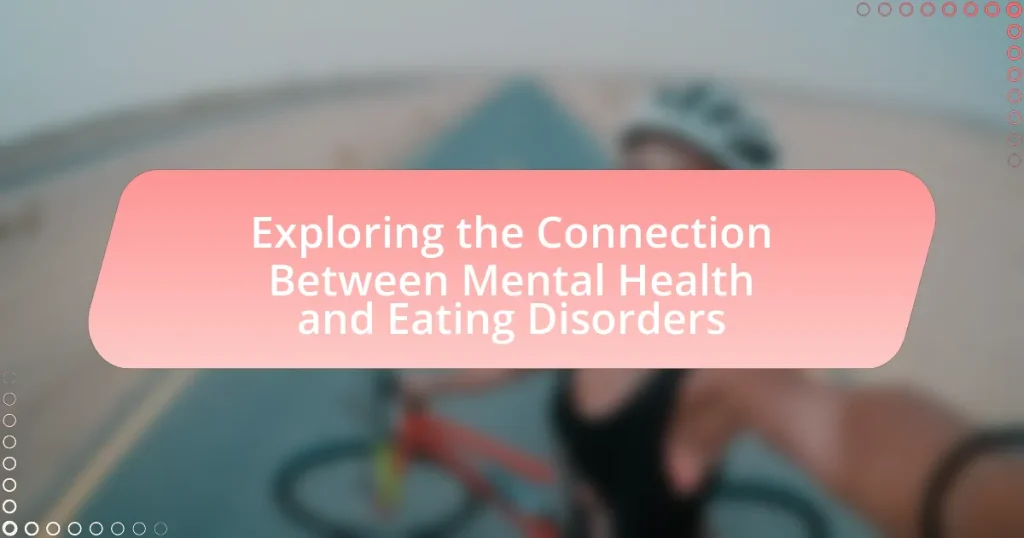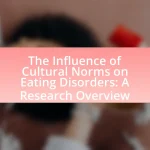The article explores the significant connection between mental health and eating disorders, highlighting how mental health conditions such as anxiety, depression, and low self-esteem contribute to the development and maintenance of eating disorders. It discusses the prevalence of co-occurring mental health issues among individuals with eating disorders and examines the emotional factors, societal pressures, and media influences that exacerbate these conditions. Additionally, the article outlines effective therapeutic approaches, the importance of a multidisciplinary treatment strategy, and the long-term psychological impacts of eating disorders, emphasizing the necessity of addressing mental health for successful recovery.
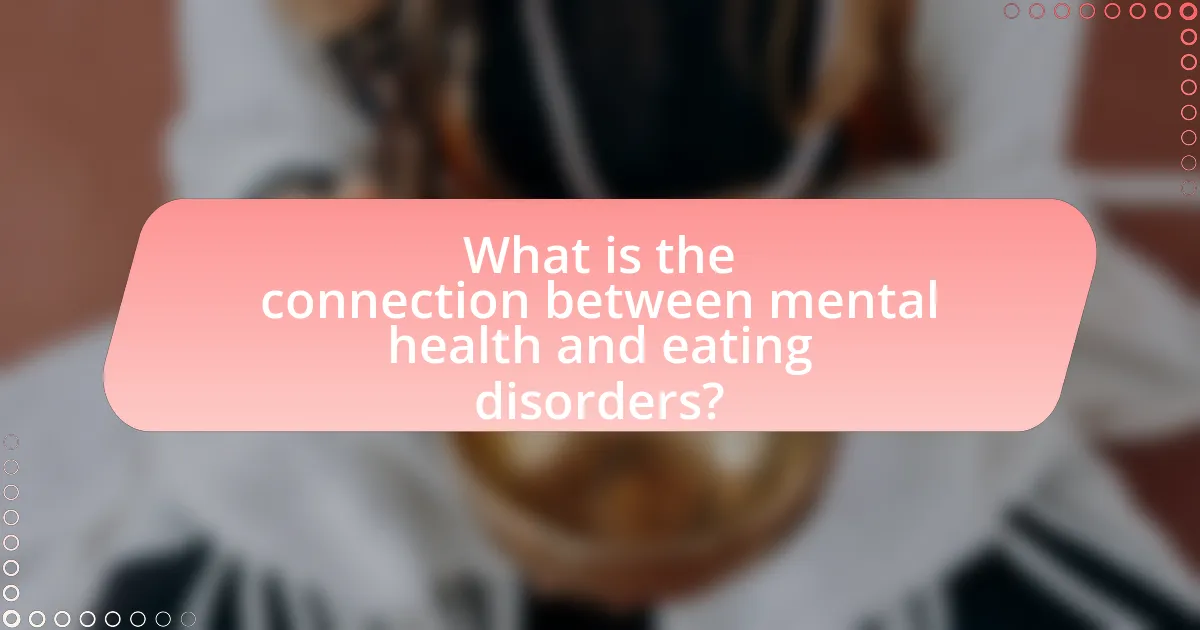
What is the connection between mental health and eating disorders?
The connection between mental health and eating disorders is significant, as mental health conditions often contribute to the development and maintenance of eating disorders. Research indicates that individuals with eating disorders frequently experience co-occurring mental health issues, such as anxiety, depression, and obsessive-compulsive disorder. For instance, a study published in the journal “Psychological Medicine” found that approximately 50% of individuals with anorexia nervosa also meet the criteria for anxiety disorders, highlighting the intertwined nature of these conditions. This relationship suggests that addressing mental health is crucial for effective treatment and recovery from eating disorders.
How do mental health issues contribute to the development of eating disorders?
Mental health issues significantly contribute to the development of eating disorders by influencing behaviors and thought patterns related to food and body image. Conditions such as anxiety, depression, and low self-esteem can lead individuals to adopt unhealthy eating habits as a coping mechanism. For instance, research indicates that individuals with anxiety disorders are more likely to engage in restrictive eating or binge eating as a way to manage their emotional distress. Furthermore, studies show that approximately 50% of individuals with eating disorders also meet the criteria for a mood disorder, highlighting the strong correlation between mental health and disordered eating behaviors. This interplay suggests that untreated mental health issues can exacerbate the risk of developing eating disorders, creating a cycle that is difficult to break.
What specific mental health conditions are commonly associated with eating disorders?
Eating disorders are commonly associated with several specific mental health conditions, including anxiety disorders, depression, and substance use disorders. Research indicates that individuals with eating disorders often experience anxiety disorders, with studies showing that up to 50% of those with anorexia nervosa also meet the criteria for an anxiety disorder. Additionally, depression frequently co-occurs, with estimates suggesting that around 30% of individuals with bulimia nervosa experience major depressive disorder. Substance use disorders are also prevalent, particularly in those with binge eating disorder, where studies have found a significant overlap, indicating that individuals may use substances as a coping mechanism for their eating-related issues.
How do emotional factors influence eating behaviors in individuals with mental health issues?
Emotional factors significantly influence eating behaviors in individuals with mental health issues by driving patterns of emotional eating, restrictive eating, or binge eating. For instance, individuals experiencing anxiety or depression may turn to food for comfort, leading to increased consumption of high-calorie, unhealthy foods as a coping mechanism. Research indicates that approximately 30% of individuals with depression engage in emotional eating, which can exacerbate their mental health conditions and lead to obesity or eating disorders. Furthermore, stress can trigger hormonal changes that affect appetite regulation, resulting in altered eating patterns. This interplay between emotions and eating behaviors highlights the complex relationship between mental health and dietary habits.
What role does societal pressure play in the relationship between mental health and eating disorders?
Societal pressure significantly contributes to the relationship between mental health and eating disorders by promoting unrealistic body standards and ideals. This pressure often leads individuals to develop negative self-image and low self-esteem, which are key risk factors for eating disorders. Research indicates that exposure to media portrayals of thinness correlates with increased body dissatisfaction and disordered eating behaviors, as evidenced by a study published in the journal “Eating Disorders” by Grabe, Ward, and Hyde in 2008, which found that women exposed to thin-ideal media reported higher levels of body dissatisfaction and eating pathology. Thus, societal expectations can exacerbate mental health issues and trigger or worsen eating disorders.
How does media representation affect body image and mental health?
Media representation significantly affects body image and mental health by shaping societal standards of beauty and influencing individual self-perception. Research indicates that exposure to idealized body types in media can lead to body dissatisfaction, which is a risk factor for mental health issues such as anxiety and depression. A study published in the journal “Body Image” by Tiggemann and Slater (2014) found that young girls who consumed more media featuring thin models reported higher levels of body dissatisfaction and lower self-esteem. This correlation highlights the detrimental impact of unrealistic media portrayals on mental well-being, reinforcing the need for more diverse and realistic representations in media to promote healthier body image and mental health outcomes.
What are the impacts of peer influence on eating behaviors and mental health?
Peer influence significantly impacts eating behaviors and mental health by shaping individuals’ dietary choices and emotional well-being. Research indicates that adolescents are particularly susceptible to peer pressure, which can lead to unhealthy eating habits, such as binge eating or restrictive dieting, often driven by the desire to conform to group norms. A study published in the Journal of Adolescent Health found that peer influence is a strong predictor of disordered eating behaviors, with 40% of participants reporting that their friends’ eating habits affected their own choices. Additionally, negative peer interactions can exacerbate mental health issues, including anxiety and depression, as individuals may feel inadequate or develop low self-esteem based on their perceived body image in relation to their peers. This connection underscores the critical role of social environments in influencing both eating behaviors and mental health outcomes.
What are the signs and symptoms of eating disorders linked to mental health issues?
Eating disorders linked to mental health issues exhibit several signs and symptoms, including extreme weight loss, preoccupation with food, body image distortion, and avoidance of social situations involving food. Individuals may also experience mood swings, anxiety, depression, and low self-esteem, which are often intertwined with their eating behaviors. Research indicates that approximately 50% of individuals with eating disorders also suffer from mood disorders, highlighting the significant overlap between these conditions.
How can one identify the early warning signs of eating disorders?
One can identify the early warning signs of eating disorders by observing significant changes in eating habits, weight fluctuations, and behaviors surrounding food. Common indicators include extreme dieting, avoidance of certain food groups, preoccupation with body image, and social withdrawal during meals. Research indicates that early intervention can improve outcomes; for instance, the National Eating Disorders Association highlights that recognizing these signs early can lead to timely treatment and better recovery rates.
What psychological symptoms accompany eating disorders?
Eating disorders are often accompanied by a range of psychological symptoms, including anxiety, depression, low self-esteem, and obsessive-compulsive behaviors. Research indicates that individuals with eating disorders frequently experience heightened levels of anxiety, which can manifest as social anxiety or generalized anxiety disorder. Additionally, depression is prevalent, with studies showing that up to 50% of individuals with anorexia nervosa and bulimia nervosa also meet the criteria for major depressive disorder. Low self-esteem is another common symptom, as individuals may struggle with body image issues and feelings of worthlessness. Obsessive-compulsive behaviors, such as preoccupation with food, weight, and body shape, are also frequently observed in those with eating disorders, further complicating their psychological state.
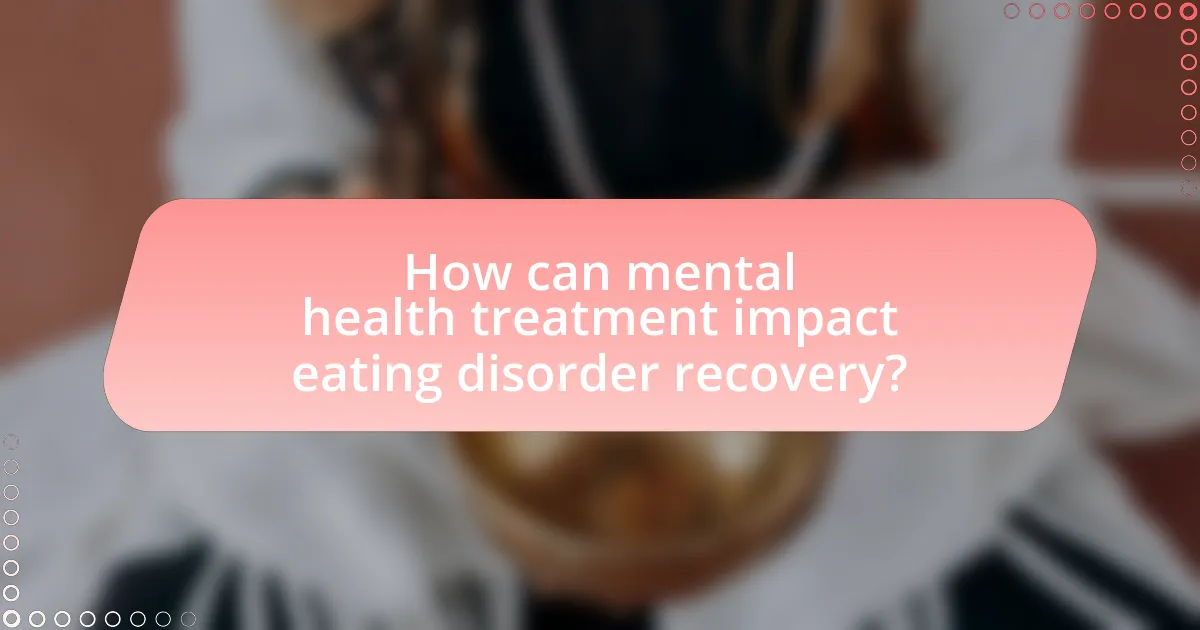
How can mental health treatment impact eating disorder recovery?
Mental health treatment significantly impacts eating disorder recovery by addressing underlying psychological issues that contribute to disordered eating behaviors. Effective mental health interventions, such as cognitive-behavioral therapy (CBT), have been shown to reduce symptoms of anxiety and depression, which are often linked to eating disorders. Research indicates that individuals who receive comprehensive mental health treatment alongside nutritional support have higher recovery rates; for instance, a study published in the Journal of Eating Disorders found that 60% of participants who underwent integrated treatment achieved full recovery compared to 30% who received standard care. This evidence underscores the importance of mental health treatment in facilitating lasting recovery from eating disorders.
What therapeutic approaches are effective for treating eating disorders?
Cognitive Behavioral Therapy (CBT) is an effective therapeutic approach for treating eating disorders. CBT focuses on identifying and changing negative thought patterns and behaviors related to food, body image, and self-esteem. Research indicates that CBT can significantly reduce symptoms of eating disorders, with studies showing that approximately 50-70% of individuals experience improvement after undergoing this therapy. Additionally, Family-Based Therapy (FBT) has proven effective, particularly for adolescents with anorexia nervosa, as it involves the family in the treatment process, leading to better outcomes. A meta-analysis published in the Journal of Eating Disorders found that FBT leads to higher recovery rates compared to individual therapy approaches. These therapeutic methods are supported by empirical evidence, demonstrating their efficacy in treating various eating disorders.
How does cognitive-behavioral therapy address both mental health and eating disorders?
Cognitive-behavioral therapy (CBT) effectively addresses both mental health issues and eating disorders by targeting the cognitive distortions and behavioral patterns that contribute to these conditions. CBT helps individuals identify and challenge negative thoughts related to body image, self-worth, and food, which are common in both mental health disorders and eating disorders. Research indicates that CBT can lead to significant improvements in symptoms of anxiety and depression, which often co-occur with eating disorders, by promoting healthier coping strategies and thought processes. A study published in the Journal of Consulting and Clinical Psychology found that CBT significantly reduced binge eating episodes and improved psychological well-being in individuals with eating disorders, demonstrating its dual efficacy in treating both mental health and eating disorders.
What role does family therapy play in the recovery process?
Family therapy plays a crucial role in the recovery process by fostering communication and support among family members, which is essential for individuals dealing with mental health issues and eating disorders. This therapeutic approach helps to identify and address dysfunctional family dynamics that may contribute to the individual’s condition, promoting healthier interactions and understanding. Research indicates that family involvement in treatment can significantly improve outcomes; for instance, a study published in the Journal of Family Psychology found that adolescents with eating disorders showed better recovery rates when family therapy was included in their treatment plan. By engaging the family, therapy not only aids in the individual’s recovery but also strengthens the overall family unit, creating a supportive environment conducive to healing.
How important is a multidisciplinary approach in treating eating disorders?
A multidisciplinary approach is crucial in treating eating disorders as it addresses the complex interplay of psychological, nutritional, and medical factors involved. Research indicates that integrating various specialties—such as psychiatry, psychology, nutrition, and medical care—enhances treatment efficacy and improves patient outcomes. For instance, a study published in the Journal of Eating Disorders found that patients receiving coordinated care from a team of professionals showed significantly higher recovery rates compared to those receiving unidisciplinary treatment. This collaborative model ensures comprehensive care, addressing both the physical and mental health aspects of eating disorders, which is essential for effective recovery.
What professionals are typically involved in the treatment of eating disorders?
The professionals typically involved in the treatment of eating disorders include psychiatrists, psychologists, dietitians, and medical doctors. Psychiatrists provide medication management and therapy, while psychologists offer psychotherapy and counseling. Dietitians specialize in nutritional education and meal planning tailored to recovery. Medical doctors monitor physical health and address any medical complications arising from the eating disorder. This multidisciplinary approach is essential for effective treatment, as it addresses both the psychological and physical aspects of eating disorders.
How does collaboration among healthcare providers enhance recovery outcomes?
Collaboration among healthcare providers enhances recovery outcomes by ensuring comprehensive and coordinated care for patients. When multiple providers, such as physicians, psychologists, and nutritionists, work together, they can address the multifaceted nature of conditions like eating disorders, which often involve both physical and mental health challenges. Research indicates that integrated care models, where providers communicate and share information, lead to improved patient adherence to treatment plans and better overall health outcomes. For instance, a study published in the Journal of Eating Disorders found that patients receiving collaborative care reported higher satisfaction and lower relapse rates compared to those receiving fragmented care. This evidence underscores the importance of teamwork in optimizing recovery for individuals facing complex health issues.
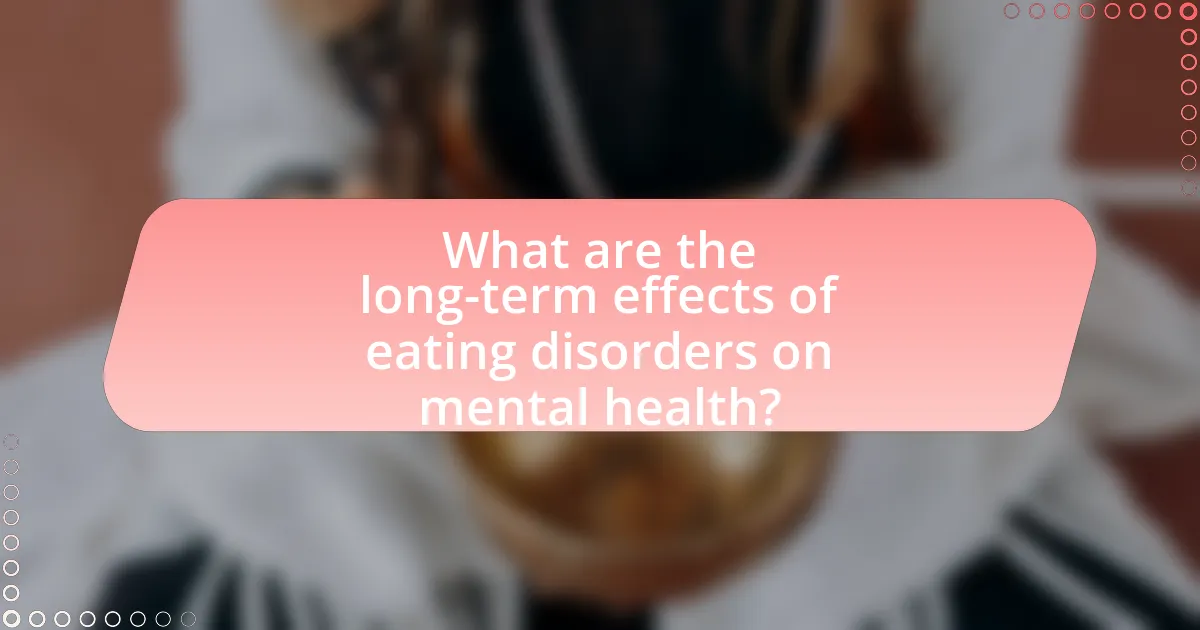
What are the long-term effects of eating disorders on mental health?
Eating disorders can lead to significant long-term effects on mental health, including chronic anxiety, depression, and increased risk of substance abuse. Research indicates that individuals with eating disorders often experience persistent psychological issues even after recovery, with studies showing that approximately 50% of individuals with anorexia nervosa and bulimia nervosa continue to struggle with mental health problems years after treatment. Furthermore, the National Eating Disorders Association highlights that these disorders can result in lasting changes to brain function, affecting mood regulation and cognitive processes.
How do eating disorders impact emotional well-being over time?
Eating disorders significantly deteriorate emotional well-being over time by fostering negative self-image, increasing anxiety, and leading to depression. Individuals with eating disorders often experience a cycle of emotional distress, where their disordered eating behaviors exacerbate feelings of shame and guilt, further damaging their mental health. Research indicates that approximately 50% of individuals with eating disorders also suffer from mood disorders, highlighting the intertwined nature of these conditions. Additionally, longitudinal studies show that untreated eating disorders can lead to chronic emotional issues, including persistent anxiety and low self-esteem, which can last long after the eating disorder itself has been addressed.
What are the potential psychological consequences of prolonged eating disorders?
Prolonged eating disorders can lead to significant psychological consequences, including anxiety, depression, and low self-esteem. Research indicates that individuals with eating disorders often experience heightened levels of anxiety, with studies showing that approximately 50% of those affected also meet the criteria for anxiety disorders. Additionally, depression is prevalent, with estimates suggesting that around 30% of individuals with eating disorders experience major depressive episodes. Low self-esteem is another common outcome, as individuals may develop a distorted body image and negative self-perception, further exacerbating their mental health issues. These psychological consequences can create a cycle that perpetuates the eating disorder, making recovery more challenging.
How can recovery from an eating disorder influence mental health positively?
Recovery from an eating disorder can significantly enhance mental health by fostering improved self-esteem and emotional regulation. Individuals who recover often experience a reduction in anxiety and depression symptoms, as evidenced by a study published in the Journal of Eating Disorders, which found that 60% of participants reported improved mood and self-image post-recovery. Additionally, recovery promotes healthier coping mechanisms, allowing individuals to manage stress more effectively, which further contributes to overall mental well-being.
What strategies can individuals use to maintain mental health after recovering from an eating disorder?
Individuals can maintain mental health after recovering from an eating disorder by implementing strategies such as establishing a balanced diet, engaging in regular physical activity, practicing mindfulness, and seeking ongoing support. A balanced diet helps to stabilize mood and energy levels, while regular physical activity can enhance overall well-being and reduce anxiety. Mindfulness practices, such as meditation or yoga, have been shown to improve emotional regulation and decrease stress. Additionally, ongoing support from therapists, support groups, or loved ones can provide essential encouragement and accountability, which are crucial for long-term recovery. Research indicates that these strategies contribute to improved mental health outcomes, as individuals who engage in supportive communities and healthy lifestyle choices report lower rates of relapse and better emotional resilience.
What lifestyle changes support ongoing mental health and well-being?
Regular physical activity, a balanced diet, adequate sleep, and mindfulness practices support ongoing mental health and well-being. Engaging in physical exercise releases endorphins, which can improve mood and reduce anxiety. A balanced diet rich in nutrients, such as omega-3 fatty acids and vitamins, has been linked to lower rates of depression and anxiety. Studies show that adults who sleep 7-9 hours per night report better mental health outcomes compared to those who sleep less. Additionally, mindfulness practices, such as meditation and yoga, have been shown to decrease stress and enhance emotional regulation, contributing to overall mental well-being.
How can support networks aid in sustaining recovery from eating disorders?
Support networks can significantly aid in sustaining recovery from eating disorders by providing emotional support, accountability, and practical assistance. Research indicates that individuals with strong social support are more likely to maintain recovery, as they experience reduced feelings of isolation and increased motivation to adhere to treatment plans. A study published in the Journal of Eating Disorders found that participants who engaged with support groups reported higher levels of recovery and lower relapse rates, highlighting the importance of community in the healing process. Additionally, support networks can facilitate access to resources, such as therapy and nutritional guidance, which are crucial for long-term recovery.
What practical steps can individuals take to address the connection between mental health and eating disorders?
Individuals can address the connection between mental health and eating disorders by seeking professional help, such as therapy or counseling, which has been shown to improve both mental health and eating behaviors. Engaging in regular physical activity can also enhance mood and reduce anxiety, contributing positively to mental health. Additionally, practicing mindfulness and stress-reduction techniques, like meditation or yoga, can help individuals manage emotional triggers related to eating disorders. Research indicates that cognitive-behavioral therapy (CBT) is effective in treating both conditions, as it helps individuals identify and change negative thought patterns related to food and body image.
